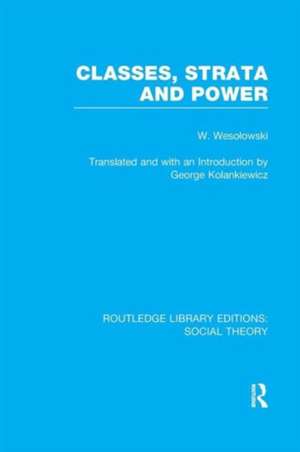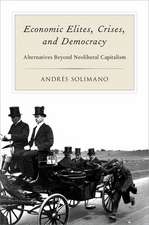Classes, Strata and Power (RLE Social Theory): Routledge Library Editions: Social Theory
Autor Wlodzimierz Wesolowski Traducere de George Kolankiewiczen Limba Engleză Paperback – 21 ian 2016
| Toate formatele și edițiile | Preț | Express |
|---|---|---|
| Paperback (1) | 416.22 lei 6-8 săpt. | |
| Taylor & Francis – 21 ian 2016 | 416.22 lei 6-8 săpt. | |
| Hardback (1) | 888.99 lei 6-8 săpt. | |
| Taylor & Francis – 8 aug 2014 | 888.99 lei 6-8 săpt. |
Din seria Routledge Library Editions: Social Theory
-
 Preț: 288.80 lei
Preț: 288.80 lei -
 Preț: 341.55 lei
Preț: 341.55 lei - 55%
 Preț: 658.96 lei
Preț: 658.96 lei - 34%
 Preț: 623.81 lei
Preț: 623.81 lei - 34%
 Preț: 764.20 lei
Preț: 764.20 lei - 34%
 Preț: 652.62 lei
Preț: 652.62 lei - 15%
 Preț: 611.89 lei
Preț: 611.89 lei - 34%
 Preț: 765.01 lei
Preț: 765.01 lei - 18%
 Preț: 847.16 lei
Preț: 847.16 lei - 34%
 Preț: 624.60 lei
Preț: 624.60 lei - 34%
 Preț: 822.34 lei
Preț: 822.34 lei - 34%
 Preț: 850.99 lei
Preț: 850.99 lei - 34%
 Preț: 679.92 lei
Preț: 679.92 lei - 34%
 Preț: 678.28 lei
Preț: 678.28 lei - 34%
 Preț: 765.43 lei
Preț: 765.43 lei - 15%
 Preț: 555.94 lei
Preț: 555.94 lei - 33%
 Preț: 498.99 lei
Preț: 498.99 lei - 34%
 Preț: 624.60 lei
Preț: 624.60 lei - 34%
 Preț: 680.31 lei
Preț: 680.31 lei - 34%
 Preț: 765.01 lei
Preț: 765.01 lei - 22%
 Preț: 311.93 lei
Preț: 311.93 lei - 34%
 Preț: 624.60 lei
Preț: 624.60 lei - 18%
 Preț: 888.99 lei
Preț: 888.99 lei - 34%
 Preț: 624.21 lei
Preț: 624.21 lei - 18%
 Preț: 1005.80 lei
Preț: 1005.80 lei - 34%
 Preț: 765.84 lei
Preț: 765.84 lei - 34%
 Preț: 823.99 lei
Preț: 823.99 lei -
 Preț: 330.87 lei
Preț: 330.87 lei - 34%
 Preț: 622.99 lei
Preț: 622.99 lei - 18%
 Preț: 1060.25 lei
Preț: 1060.25 lei - 34%
 Preț: 678.69 lei
Preț: 678.69 lei - 18%
 Preț: 886.63 lei
Preț: 886.63 lei - 34%
 Preț: 678.28 lei
Preț: 678.28 lei - 34%
 Preț: 623.81 lei
Preț: 623.81 lei - 34%
 Preț: 682.65 lei
Preț: 682.65 lei - 31%
 Preț: 454.52 lei
Preț: 454.52 lei - 34%
 Preț: 765.43 lei
Preț: 765.43 lei - 25%
 Preț: 277.11 lei
Preț: 277.11 lei - 34%
 Preț: 763.78 lei
Preț: 763.78 lei - 33%
 Preț: 554.64 lei
Preț: 554.64 lei - 34%
 Preț: 680.73 lei
Preț: 680.73 lei - 34%
 Preț: 764.62 lei
Preț: 764.62 lei - 34%
 Preț: 991.80 lei
Preț: 991.80 lei - 34%
 Preț: 763.78 lei
Preț: 763.78 lei - 34%
 Preț: 622.59 lei
Preț: 622.59 lei - 34%
 Preț: 764.62 lei
Preț: 764.62 lei - 18%
 Preț: 1059.45 lei
Preț: 1059.45 lei - 18%
 Preț: 1000.27 lei
Preț: 1000.27 lei
Preț: 416.22 lei
Nou
Puncte Express: 624
Preț estimativ în valută:
79.65€ • 82.69$ • 66.42£
79.65€ • 82.69$ • 66.42£
Carte tipărită la comandă
Livrare economică 22 martie-05 aprilie
Preluare comenzi: 021 569.72.76
Specificații
ISBN-13: 9781138970854
ISBN-10: 1138970859
Pagini: 186
Dimensiuni: 156 x 234 x 10 mm
Greutate: 0.45 kg
Ediția:1
Editura: Taylor & Francis
Colecția Routledge
Seria Routledge Library Editions: Social Theory
Locul publicării:Oxford, United Kingdom
ISBN-10: 1138970859
Pagini: 186
Dimensiuni: 156 x 234 x 10 mm
Greutate: 0.45 kg
Ediția:1
Editura: Taylor & Francis
Colecția Routledge
Seria Routledge Library Editions: Social Theory
Locul publicării:Oxford, United Kingdom
Cuprins
Part 1. Classes and Power 1. The Marxian Theory of Class Domination: An Attempt at Systematisation 1.1. The Marxian Theory of Society 1.2. The Theory of Class Domination 1.3. Domination and the Mechanisms of Government 1.4. The Problem of the 'Balance of Classes' 2. Dominant Class and Power Elite: The Dimensions of Analysis and their Interconnections 2.1. Fundamental Distinctions 2.2. Class and Elite 2.3. Class Domination and Elite Power 2.4. Power Elite and Class Interests Part 2. Strata and Power 3. The Functionalist Theory of Stratification: The Unequal Division of Income, Prestige and Power 3.1. Fundamental Propositions of the Theory 3.2. Some Problems of Interpretation of the Theory 3.3. The Mechanism of Selection 3.4. The Mechanism of Motivation 3.5. The Functional Aspect of Power and Stratification 4. The Processes of Transformation of the Class Structure in the Socialist Formation: Selected Problems 4.1. Perspectives 4.2. Socialist Society and the Marxian Theory of Class Structure 4.3. The Process of Decomposition of Class Attributes 4.4. Class Domination and Socialist Society 4.5. The Community and Conflict of Interests in Socialism 4.6. Contradiction of Interests Concerning Non-Economic Goods 4.7. Two Tendencies
Notă biografică
W. Weso?owski, George Kolankiewicz
Descriere
Professor Wesolowski presents a detailed study of Marx's theory of class structure and compares it with non-Marxist theories of social stratification, in particular the functionalist theory of stratification and the theory of power elite. He is also concerned to develop and extend the Marxist approach to the study of class structure and social stratification in a socialist society. The book begins with a thorough and original reconstruction of Marx's theory of class domination in a capitalist society, and goes on to show that contemporary non-Marxist theories of power elites complement rather than contradict Marx's concept of class domination. The author examines in detail the functionalist theory of stratification, but rejects it, preferring the Marxist approach. Finally, though, he demonstrates the complementary nature of the two approaches to the study of class structure by expounding a comprehensive paradigm for empirical research based on Marxist theory but including some elements of contemporary stratification theories as well.
























